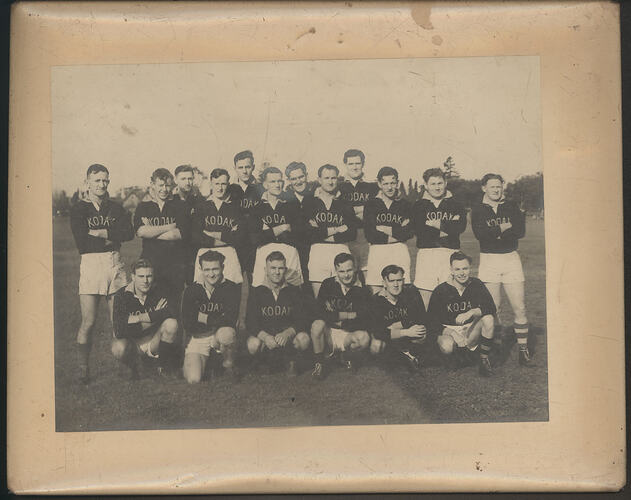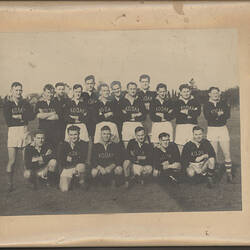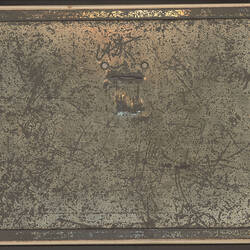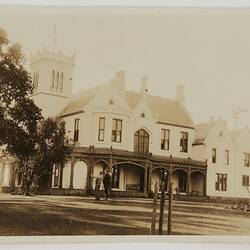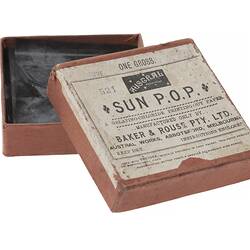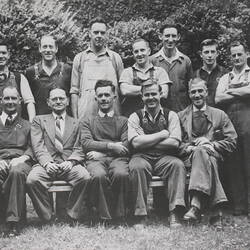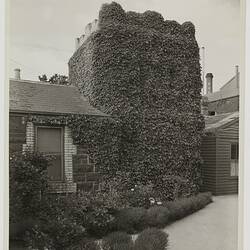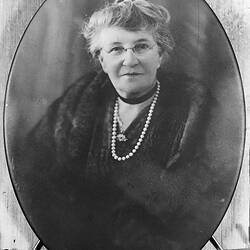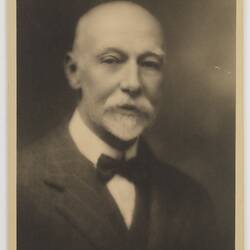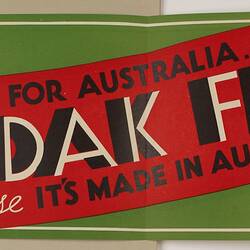Summary
Photograph of Kodak Australasia Pty Ltd's staff Australian Rules football team who won the VFASD C Grade premiership in Melbourne, at the Brunswick Football Oval, in 1949.
The donor, Mr Walter Whitworth, is shown at bottom left. He played the position of ruck and told Museums Victoria that he kicked the winning goal in the match. He was allowed to keep the pennant flag that the team won for the premiership. The man at bottom right is believed to be Bill Williams. The photographer is thought to be a Kodak staff member.
Walter recalled that Kodak's Managing Director, Mr Edgar Rouse, was so thrilled with the premiership win by the company team that he presented all of the players with specially made 'premiers ties', and also generously gave the team a weekend away at a hotel in Cowes on Philip Island as a reward for their great sporting achievement.
Walter Whitworth started work at Kodak in 1946 and left about 1952. He worked as a maintenance mechanic in the Kodak garage, but also drove the company coal truck as well as driving executive staff including the Managing Director Mr Edgar Rouse and company secretary Mr Paige when their usual driver was away. He also drove the football and cricket teams to their games on weekends, and along with other staff drivers, drove a range of staff to work during the 9 week transport strike in 1950, to keep the factory operational.
Part of a small group of photographs and football premiership related objects that Walter Whitworth has donated to the Museum. An oral history was also conducted with Walter about his working and social life at Kodak.
Description of Content
Photograph of 18 football players in uniform posed on a grass oval. There are 12 men in the back row and 6 men in the front row. The team wear white shorts and dark coloured jumpers with collars that are inscribed 'Kodak'. There are trees in the background.
Physical Description
Black and white landscape format photograph encapsulated in plastic on top of a metal frame. The back has a slot and two holes for hanging.
Significance
Statement of Significance
This item enhances our understanding of photographic manufacturing and retailing in Australia, and specifically traces the history of Kodak and its workforce in Australia, bringing the factory workers to life through a visual medium. This particular photograph not only tells the story of sport and recreation among Kodak workers, showing insight into a different aspect of working life at the company, but it also feeds into the larger story of workplace sport, and specifically football, which had been a popular pursuit in Melbourne, especially in the interwar years.
During its heyday, workplace football was significant in working class identity, culture and politics. It also played a role in industrial relations through promoting company values and employee harmony, and it contributed to the changing nature of the football game and spectatorship. Following WWII, workplace football underwent a gradual decline and by the end of the twentieth century it had largely disappeared. As industry had shifted from its previously male dominated, inner-city domain to include more women in the workforce in new outer suburban locales after WWII, there was less interest in workplace football, especially as the link diminished between where people lived and worked, and company related sport required travelling across the city away from home. Increased leisure time and new leisure opportunities, a more affluent society and lifestyle changes in the post-war also contributed to a shift away from company based sporting activity.
More Information
-
Collection Names
-
Collecting Areas
-
Acquisition Information
Donation from Walter Whitworth, 13 May 2014
-
Organisation Depicted
Kodak (Australasia) Pty Ltd, Brunswick Street, Brunswick, Greater Melbourne, Victoria, Australia, 1949
-
Individuals Identified
Bottom left; Whitworth, Walter; Bottom right; Williams, Bill
-
Format
Photograph, Black & White
-
Classification
-
Category
-
Discipline
-
Type of item
-
Overall Dimensions
245 mm (Width), 4 mm (Depth), 145 mm (Height)
-
Keywords
Manufacturing, Manufacturing Workers, Photography, Sport, Football Teams, Sports Ovals, Competitions, Sporting Teams, Leisure, Working Life
